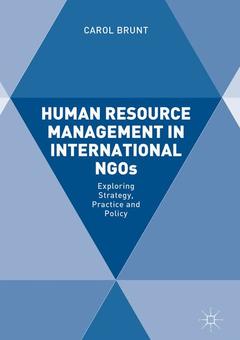Description
Human Resource Management in International NGOs, 1st ed. 2016
Exploring Strategy, Practice and Policy
Author: Brunt Carol
Language: English
Subjects for Human Resource Management in International NGOs:
Approximative price 52.74 €
In Print (Delivery period: 15 days).
Add to cartPublication date: 04-2021
173 p. · 14.8x21 cm · Paperback
Approximative price 105.49 €
In Print (Delivery period: 15 days).
Add to cartPublication date: 10-2016
Support: Print on demand
Description
/li>Contents
/li>Biography
/li>Comment
/li>
This insightful book examines human resource management practice and its perceived impact on performance in the non-profit sector. Presenting case studies of six NGOs in Kenya, it explores HRM practices in a non-profit setting, and uncovers details about HRM practice by organizations in the development sector that are not found in NGO management books. Informed by the author?s practical experience in the field, Human Resource Management in International NGOs is a unique study that marries theory and practice, challenging the reader to reflect on the interpretative application of management theory and stakeholder participation.
Chapter 1 Exploring the Black Box and Paradox.- Chapter 2 Recruitment.- Chapter 3 Selection.- Chapter 4 Employee Participation.- Chapter 5 mplications for INGO Management Process.- Chapter 6 What have we learned?.
Carol Brunt is an Assistant Professor in the College of Business and Economics (COBE) at the University of Wisconsin-Whitewater, US. Also a development practitioner, she has held multiple management positions within the development sector while living and working in Sub-Saharan Africa. Her academic research has been published in peer-reviewed journals including the International Journal of Human Resource Management, and presented at conferences including the African Academy of Management, the Academy of Management and the International Research Society for Public Management.
Explores the inside workings of INGO management and provides insight into HRM practice through empirical research
Presents a unique study conducted among six INGOs in Kenya
Reflects on current HR policies and practices, features of stakeholder participation and interpretative application of HR policies in international settings.
Establishes a foundation for future comparative HRM research in the development sector




